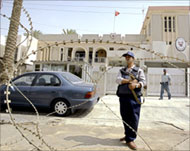Iraq attacks target diplomatic figures
In what appears to be a message to countries intent on upgrading diplomatic ties with Baghdad’s US-backed government, several diplomats and diplomatic missions have come under attack in Iraq.

On Tuesday, the Interfax news agency reported that a Russian convoy had come under fire, adding to attacks on Pakistani, Bahraini and Egyptian envoys.
The incident, which occurred on Sunday, involved two cars belonging to the Russian embassy in Baghdad.
They came under fire, but no embassy personnel were injured, a Russian Foreign Ministry spokesman said.
Alexander Yakovenko said the cars were fired on while en route to Baghdad airport; the airport road is regarded as one of Iraq’s most dangerous for attacks.
The shooting comes amid rising concern over attacks on
diplomats in the Iraqi capital, but Yakovenko was quoted as
saying the fire “was not aimed specifically at the Russian
Embassy cars, but was scattered”.
Attacking envoys
Earlier on Tuesday, Aljazeeera reported that the Bahraini and Pakistani envoys to Iraq had been attacked by armed men in Baghdad.
Four armed men opened fire on the Bahraini envoy’s car in the capital’s upscale Mansur neighbourhood as he was being driven to work on Tuesday, a police source said. The driver was unharmed.
A hospital source said the envoy, Hassan Malalla al-Ansari, was wounded in the right hand by a single bullet. The motive for the attack was unclear.
Later on Tuesday, armed men opened fire on a convoy carrying Pakistan’s envoy to Iraq in the third attack on a senior diplomat in three days, police sources said.
The attacked diplomat escaped unhurt, but described the situation as very dangerous.
Relocation
Pakistan is to withdraw its ambassador from Iraq after the envoy said he had a “very narrow escape” from an attack on his convoy in Baghdad on Tuesday.
Envoy Younis Khan will be moved to the Jordanian capital, Amman, following the assassination attempt, Pakistan’s Foreign Ministry said.
 |
|
Iraqi security men guard the |
Iraq’s Interior Ministry said the attack happened at an intersection in the Mansur district, not far from where Bahrain’s envoy was wounded just hours earlier in an apparent kidnap attempt.
“I am safe, but it was a very narrow escape,” Khan said.
Khan, who was posted to Baghdad only two months ago, said gunmen in two cars opened fire on his vehicle when he was about a kilometre from the Pakistani embassy.
“I was returning to my home when two cars came from behind. There were armed men inside and they fired at my car. But luckily the bullets did not hit my car,” Khan said.
Security guards in another car travelling with him immediately opened fire on his attackers, Khan said, adding that “some bullets hit one of the attackers’ cars”.
“We sped out of danger, but it was an extremely dangerous situation,” he said.
New tactic
Egypt’s ambassador-designate to Iraq, Ihab al-Sharif ,was abducted in Baghdad on Saturday in the first incidence of what is thought to be a new tactic by insurgents to target Muslim envoys.
Pakistani Foreign Ministry spokesman Naeem Khan said no one was injured in the attack on the envoy’s convoy.
“We have been watching the security situation in Iraq and we have decided to relocate the ambassador to Amman. But this in no way dilutes our commitment to continuing to work for a peaceful and stable Iraq,” he said.
“The decision is geared solely to ensure the safety of our personnel in Iraq and will be reviewed the moment we detect any improvement in the security situation there.”
Ambassador Khan added: “It is not safe because the security situation here is extremely bad.”
Key ally
Pakistan opposed the March 2003 invasion of Iraq despite being a key ally in the US “war on terror”. It has refused requests from both the US and the Iraqi leadership to send peacekeeping troops.
However in April, an employee at the Pakistani embassy in Baghdad was abducted as he went to a mosque for evening prayers.
|
“It is not safe because the security situation here is extremely bad” Naeem Khan, |
Malik Mohammad Javed, a non-diplomatic official at the Pakistani mission, was freed two weeks later after Islamabad sent a special envoy to the Iraqi capital. Pakistan denied paying a ransom.
In July 2004, two migrant workers from Pakistani Kashmir were killed in Iraq after their captors alleged they were spying for the United States and that Pakistan was planning to deploy troops in Iraq.
Another kidnapped Pakistani, Amjad Hafeez, was released the same month after eight days in captivity.
Message
Speaking to Aljazeera, chief editor of al-Siyada (Sovereignty) newspaper Abd al-Sattar Jawad said the killings were a message to those Arab countries intending to boost ties with the current Iraqi government.
“This is a message to the Arab countries which announced their intentions to open embassies in Baghdad, or elevating their diplomatic representations,” he said.
“These Arab countries were targeted after the Brussels conference held under US pressure.”
Jawad believes the attacks on diplomats also aim at intimidating the US-backed Iraqi government, and consequently aim to hinder the intended diplomatic improvements.
“Boosting diplomatic ties will ultimately strengthen the Iraqi government’s position. Thus, the blow was intended to prove that the Iraqi government is too weak to defend the embassies and diplomats,” Jawad said.
Bad phenomenon
Iraq’s government spokesman said the attacks on the Egyptian and Bahraini diplomats were part of an effort to intimidate countries considering upgrading their ties with Iraq.
Sunni Arab cleric Harith al-Dhari condemned all kidnappings, calling them “a bad phenomenon that emerged after the occupation of Iraq by America and its allies”.
Al-Dhari heads the Association of Muslim Scholars.